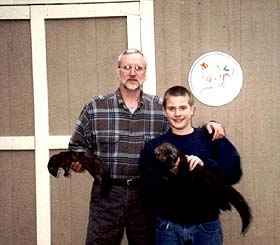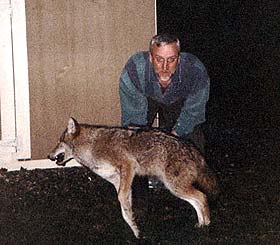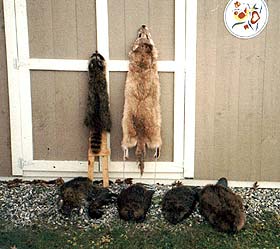|

Home
> Features
> You are here: The Trapping Judge, Part 2
The Trapping Judge, Part 2
By Mel Liston*
|

Jack with a mink and Ethan with a fisher both caught on the same day
in 2004
|
...As his father had done for him Jack passed on the enforced passion
for reading. The old trapping magazines and collection of trapping
manuals were soon being well read by Ethan. Questions about furbearing
animals or the traps hanging in the shed were becoming the norm. Stones
Throw Farm developed so that they now raised grass fed beef cattle and
organic vegetables for their own table. Ethan exhibited growing signs of
gratification when helping with chores or participating in the process
of providing for the family. Ethan now marketed all surplus produce from
his stand at the local farmers market. Three quarters of the farm
acreage is managed as multipurpose woodlot. Timber stand improvement,
annual firewood harvest, and wildlife habitat development are all
aspects of the plan. The hunters and gatherers in this family looked forward
to an increased harvest of renewable resources including natural and
organically grown wild game meat for the table. As the encouraged
numbers of wildlife species increased so too did the predator
populations
which prey on them. It was beginning to look as if their efforts to
improve habitat so as to encourage certain game species was becoming
futile because of predation. The ability to manage the predator species
was missing and all knew that regular trapping was the solution. Young
Ethan was adamantly a wannabe trapper and was increasingly persistent
that he and Dad must trap together. Jack kept telling his boy that they
would trap together but the someday down the road appeared increasingly
unlikely as constant responsibilities in the legal career seemed to make
that eventuality ever more distant. Jack had done as many fathers
unknowingly do. The dreams passionately kept alive for himself, had
become the passion of an adoring son who absorbed them as his own. The
dedicated and responsible family man would now have to look closely and
realistically at the timing of his entry into the trapping tradition for
the intersection of powerful forces were coming together for maximum
potential. Never again would the father find a situation and opportunity
such as now presented itself. The need to be a trapper for multiple
reasons was increasing sharply in priority. The analytical mind of a
judge was finishing up the final deliberation before determining that a
trap line with his son was the correct and appropriate verdict. Many
parents never find a way to realize a lost or delayed dream, but in this
case the father would be rescued and shown the way by his son.
|

Jack Yazinski with the first coyote caught on Stones Throw Farm
|
Jack was appointed to be a District Court Judge by Governor Jean
Shaheen in 2001. Much of the caseload is dealing with juvenile issues,
fascinating and rewarding work but always challenging. Most of the youth
before the bench are born with two strikes against them and now face a
fastball pitch. Almost without exception these are youth without a solid
parent or adult mentor in their lives, few can site instances of
activities they enjoy together with a parent. When asked how they spend
their time, most at-risk youth say they just hang out or play video
games. The kids before the bench have been involved with drugs,
shoplifting, assaults, or burglary and very often will have to be placed
outside the home in an institutional setting for one or two years. With
over a thousand such troubled youth coming before Jack the Judge, and
their background stories so painfully similar, Jack the Father had much
to compare and measure in his own story and that of his son Ethan. The
opportunity for a father and son to bond through a common love and
interest for outdoor activities such as hunting, fishing, or trapping
provides benefit, which is measurable and significant.
The practice of
the hunter/gatherer family group and the opportunities to bond and
mentor is a growth and maturity process which is as old as the human
spirit, it has only recently been deigned to a significant portion of
the modern population, and the consequence of its loss is evident in a
growing population of troubled youth who are without purpose or goal.
Jack can see the loss of affection, purpose, and hope in the face of
troubled youth and knows the difference that is evident in his and other
involved youth who beam when fishing, have pride in outdoor skills
learned, and have purpose when contributing wild game for the family
table. What a difference it could have made if only these other youth
had a parent or adult mentor who would spend time with them enjoying a
natural outdoor pursuit, learning about life, laughing and knowing they
are loved, building confidence. Yes Ethan, your dad will take the time
to run a trap line with you so that you may both have that experience
together, so the old man may be a boy once again and the boy may grow
into a fine young man.
In the fall of 2002 Elliot Brown, a young trapper in the area, was
tending his fisher line near Stones Throw Farm. He and Ethan became
great friends. Elliot would stop by and show his catch. That was all she
wrote, as Ethan would be delayed no longer. The conversation that
settled the issue was decided before it took place, as if written on a
biblical stone before time began. Everyone knew it was right, it was
good, and it was time. Mom was not comfortable with the coyote that were
increasingly emboldened and coming ever closer to the house, or the
fisher tracks in the snow along the tree line. Nancy had become a close-to-the-earth country farm lady and the idea of being a trapper's wife
and a trapper's mom had a wholesome and enduring sound she embraced.
Jack and Ethan both took the Trapper Education course given by New
Hampshire Trappers Association Educational Director Mike Morrison in the
spring of 2003 and were certified to become licensed trappers. Finally
the old traps hanging on the shed wall would come down and be put to
service. It was great fun for the father and son trapping partners with
their first trap line having both water and land opportunities, they
stayed in Sullivan county mostly on their own property and abutting
farms along the Connecticut River. Mom was so emotionally thrilled when
her son came running into the house with his first trapped fisher in his
arms, so proud and happy for both her boys. Ethan and Jack did all the
fur handling for their catch and one of the buildings on the farm is now
officially the fur shed. It was tough to let go of that first years
catch, as both father and son would go to the shed often and look at
their collection of fur, remembering much from their quality time
together. Eventually the fur must go to be utilized for the utility
purpose that underlies its value as a renewable resource. The catch was
entrusted to the local fur buyer Bill Bailey and shipped to the Fur
Harvesters Auction in Canada. One of Ethan's fisher pelts in that
collection sold for $47, which was the highest price paid for a fisher
at that auction. The trapping Yazinski partners have two years
experience to their credit and an invaluable life experience between a
father and son. As with all trappers they are readying equipment,
gaining permission to expand their trap line, and otherwise preparing in
the off season for their third season. Most likely this father and son
will trap together until Ethan is off to make his way in the world, then
I would not be surprised to see that Jack continues to trap alone, as
the momentum and lifestyle will now be his.
|

The Yazinski's first day catch of 2004
|
Because Jack is in the legal profession the circles in which he
travels are different from most trappers. Occasionally trapping
will come up in conversation or the experiences of the trapper will come
out. Jack has no problem expressing the value and necessity of trapping
in the modern era. In his own words-- "I live on land that has been
farmed since before the Revolutionary War. We have coyotes, gray and red
fox, mink, beaver, fisher, raccoons, and muskrats. Some die every year,
all will die at some point. That is a fact of our existence. We harvest
a sustainable amount. We manage our land in a way that enhances
wildlife, which includes controlling their populations. I believe that
will always need to be done and that trapping and hunting are the most
ethical and humane ways. I have read volumes about the ethics and
morality of trapping. I have resolved this question for myself on an
intellectual and spiritual basis. As long as our wildlife biologists
believe that they need trapping as a management tool, I will continue to
trap."
It is true that many suffer in silence due to their disconnection
from an active part in the natural world. Millions of years of genetic
predisposition are challenged every day as we make our way in a modern
world with most of the realities of survival and connection to the
ecosystems masked by technology. As we move ever further away from
lifestyles which provide opportunities for togetherness, mentoring, and
development of positive aspects by example, young and old alike will
suffer from the loss of something they have never known. The Honorable
John J. Yazinski has seen this play out in far too many of our at-risk
youth and chooses hunting, trapping, and fishing as the means to connect
with his son and mentor those qualities which will instill meaning,
confidence, purpose and love into the bond between a father and his son.
I say, "Jack is the Judge, so you be the Jury."
*Mel Liston, from Strafford, New Hampshire is a
freelance writer, Trapper Education Instructor, Director for the New
Hampshire Trappers Association and a member of the National Trappers
Association and the Fur Takers of America.

Home
> Features
> You are here: The Trapping Judge, Part 2

|